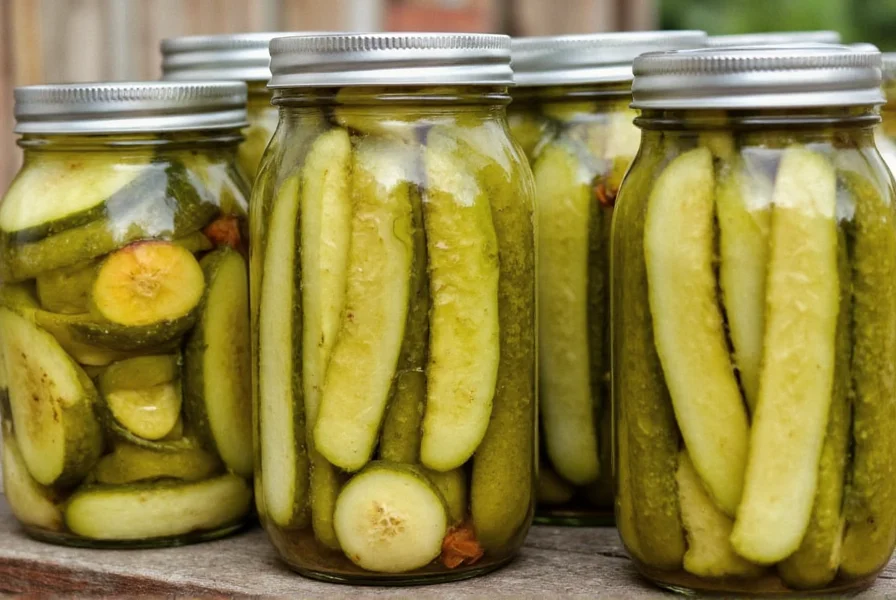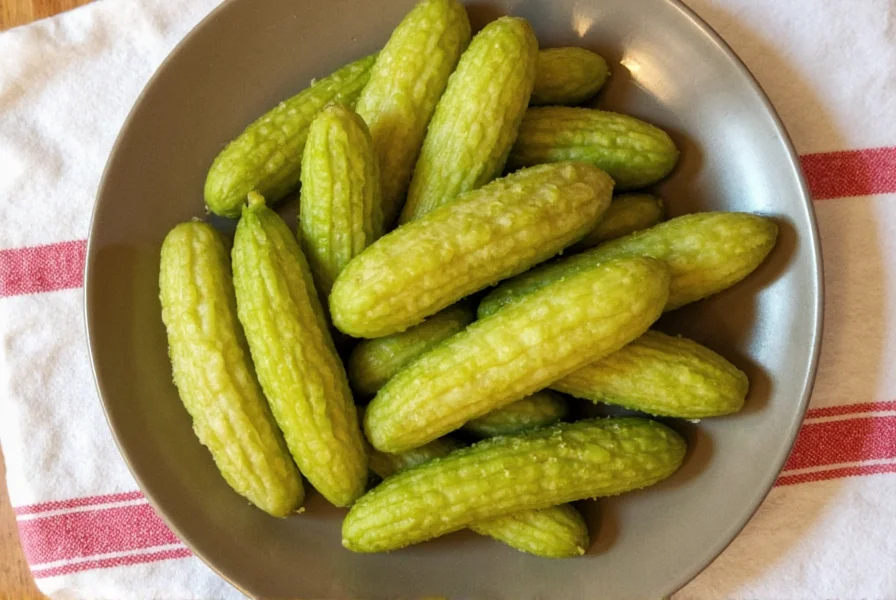Yes, some pickles are fermented, but many popular store-bought varieties are not. Fermented pickles are made with saltwater brine and natural bacteria, while vinegar pickles are made with vinegar and heat treatment. This article explains the key differences, health benefits, and how to identify authentic fermented pickles for gut health and superior flavor.
| Type of Pickle | Making Method | Fermented? |
|---|---|---|
| Dill Pickles (Traditional) | Saltwater brine, time, no heat | ✅ Yes |
| Vinegar Pickles | Vinegar + heat sterilization | ❌ No |
| Bread and Butter Pickles | Sweet vinegar brine, pasteurized | ❌ No |
| Quick Pickles (Refrigerator Pickles) | Short soak in vinegar, stored cold | ❌ No |
| Korean, Japanese, Indian Fermented Pickles | Spiced brines, ambient aging | ✅ Yes |
What Are Pickles, Anyway?
Pickles are preserved vegetables—most commonly cucumbers—soaked in a solution to prevent spoilage and add flavor. The key distinction is in the preservation method: saltwater brine fermentation versus vinegar-based preservation.
Only pickles made with saltwater brine undergo natural fermentation, creating lactic acid bacteria that preserve the cucumbers and provide probiotic benefits. Vinegar-based pickles are simply soaked in acidic solution and heat-treated, skipping the fermentation process entirely.
Fermentation Basics: What Does It Really Mean?
Fermentation is a natural process where microorganisms like bacteria convert carbohydrates into organic acids. For pickles, lactic acid bacteria (LAB) consume cucumber sugars and produce lactic acid, lowering pH and preserving the vegetable naturally.

This process creates probiotics, enhances flavor complexity, and provides natural preservation without artificial additives. True fermented pickles must be made with saltwater brine without vinegar or heat treatment.
Why It Matters: Health Benefits & Flavor Differences
Fermented pickles offer significant health benefits that vinegar pickles lack:
- Probiotics: Live cultures that support gut health, digestion, and immunity
- Natural Preservation: Lactic acid preserves without chemical additives
- Complex Flavor: Deeper, more nuanced taste from natural fermentation
- Texture: Firmer crunch compared to vinegar pickles
Vinegar pickles lack probiotics and have a one-dimensional sourness from acetic acid. They also often contain preservatives and may be pasteurized, destroying any potential live cultures.
How to Spot Real Fermented Pickles in Stores
| Brand | Description | Features | Best For | Where to Buy |
|---|---|---|---|---|
| Bubbies | Old-school, salt-brined pickles made without vinegar | Live cultures, no preservatives, firm texture | Health-conscious eaters, fermentation lovers | Health food stores, Whole Foods |
| Grillo's | Italian-style dill pickles with minimal ingredients | Unpasteurized, naturally fermented | Elegant appetizers, cheese pairings | Gourmet shops, online retailers |
| NY Brine | New York-style kosher dills with bold garlic punch | Traditionally brined, robust flavor | Sandwiches, deli bites | Supermarkets, specialty grocers |
| WayFruit | Plant-based fermented pickles using non-traditional veggies | Vegan, gluten-free, probiotic-rich | Vegan lifestyles, adventurous eaters | Online, select co-ops |
| Boar's Head | Mildly fermented half-sour pickles | Balanced tanginess, good intro for newbies | Beginners, kids | Most supermarkets |
Look for these labels:
- "Contains live cultures"
- "Naturally fermented"
- "No vinegar added"
- "Keep refrigerated"
Avoid products labeled "shelf-stable" or "pasteurized"—those won't contain live probiotics.
FAQ: Your Burning Questions About Fermented Pickles Answered
Are all pickles fermented?
No, not all pickles are fermented. Traditional dill pickles made with saltwater brine are fermented through lactic acid bacteria, while most store-bought pickles are made with vinegar and are not fermented. Vinegar pickles get their sourness from acetic acid rather than natural fermentation.
What's the difference between fermented pickles and vinegar pickles?
Fermented pickles are made with saltwater brine that allows natural bacteria to convert sugars into lactic acid over time. Vinegar pickles are made by pouring hot vinegar solution over cucumbers, which immediately preserves them without fermentation. Key differences include process (time vs. immediate), flavor complexity (deeper vs. one-dimensional), and health benefits (probiotics present vs. absent).
Do fermented pickles have probiotics that benefit gut health?
Yes! True fermented pickles contain live probiotic cultures that support gut health. These beneficial bacteria help maintain a healthy gut microbiome, linked to improved digestion, stronger immunity, and better mental health. However, probiotics only remain active if pickles haven't been pasteurized or treated with preservatives.
How can I tell if pickles are truly fermented when shopping?
Look for "Contains live cultures," "Naturally fermented," "No vinegar added," and "Keep refrigerated" on labels. Avoid "shelf-stable" or "pasteurized" products. Brands like Bubbies, Grillo's, and NY Brine typically offer authentic fermented options.
Are fermented pickles safe to eat?
Yes, when properly made, fermented pickles are completely safe. The lactic acid produced during fermentation preserves the cucumbers and creates an environment inhospitable to harmful bacteria. Fermentation has been used safely for thousands of years as a food preservation method.
How long do fermented pickles last in the refrigerator?
Properly fermented and refrigerated pickles can last 4-6 months or longer. The fermentation process continues slowly in the refrigerator, improving flavor over time. Always use clean utensils and ensure pickles stay submerged in brine to prevent contamination.
Can I eat fermented pickles if I'm on a low-sodium diet?
Traditional fermented pickles contain salt necessary for fermentation. You can reduce sodium by rinsing store-bought pickles before eating or using less salt in homemade versions (though this may affect texture and safety). Some specialty brands offer lower-sodium fermented options.
Conclusion: Crunch Into the Truth!
Some pickles are fermented, but many popular store-bought varieties are not. Only pickles made with saltwater brine undergo natural fermentation, creating probiotics and complex flavors. Vinegar-based pickles skip fermentation entirely and lack these health benefits.

When choosing pickles for gut health or superior flavor, look for labels indicating "live cultures," "naturally fermented," and "no vinegar added." These will deliver the authentic fermented experience you're looking for.











 浙公网安备
33010002000092号
浙公网安备
33010002000092号 浙B2-20120091-4
浙B2-20120091-4